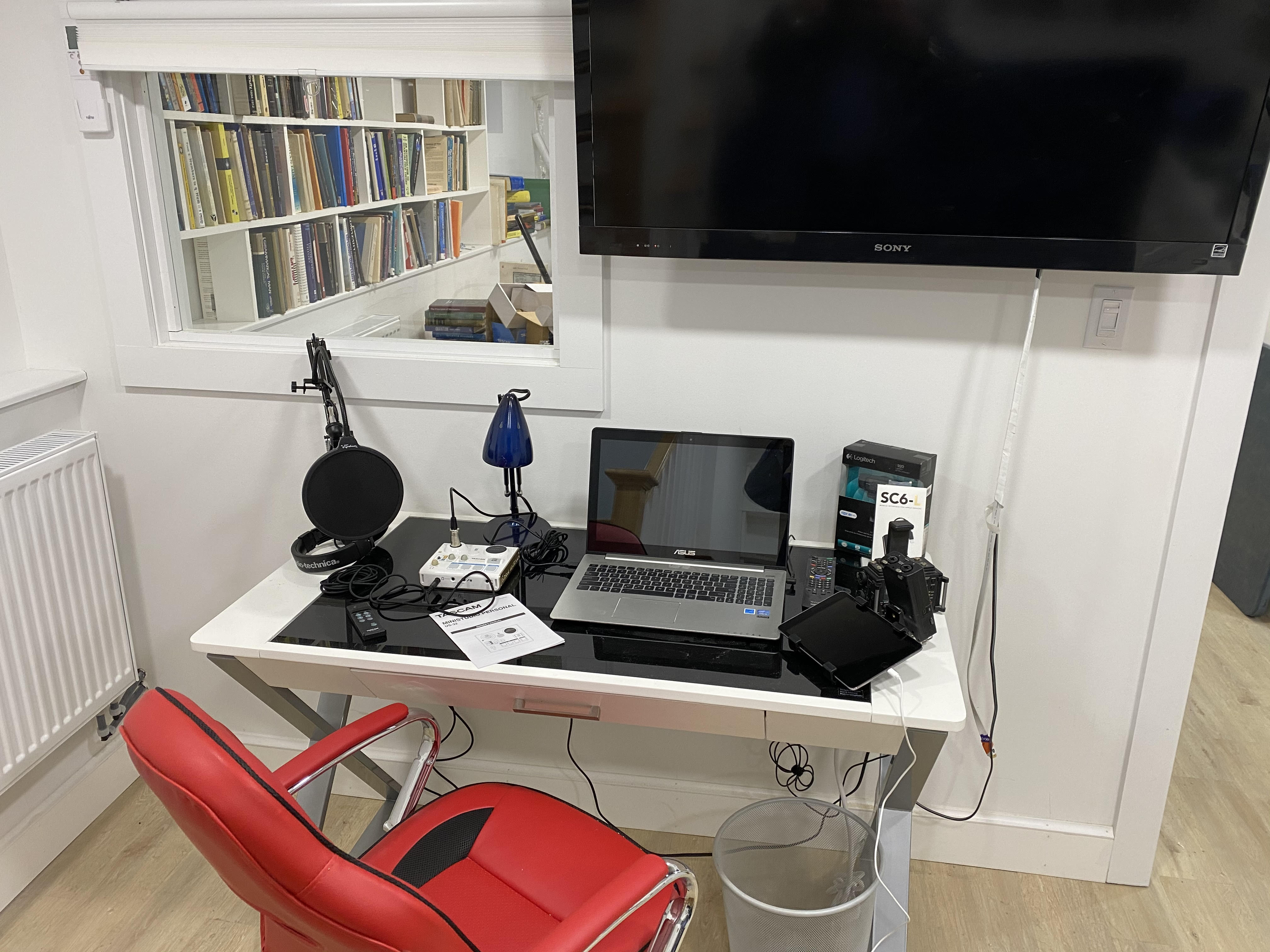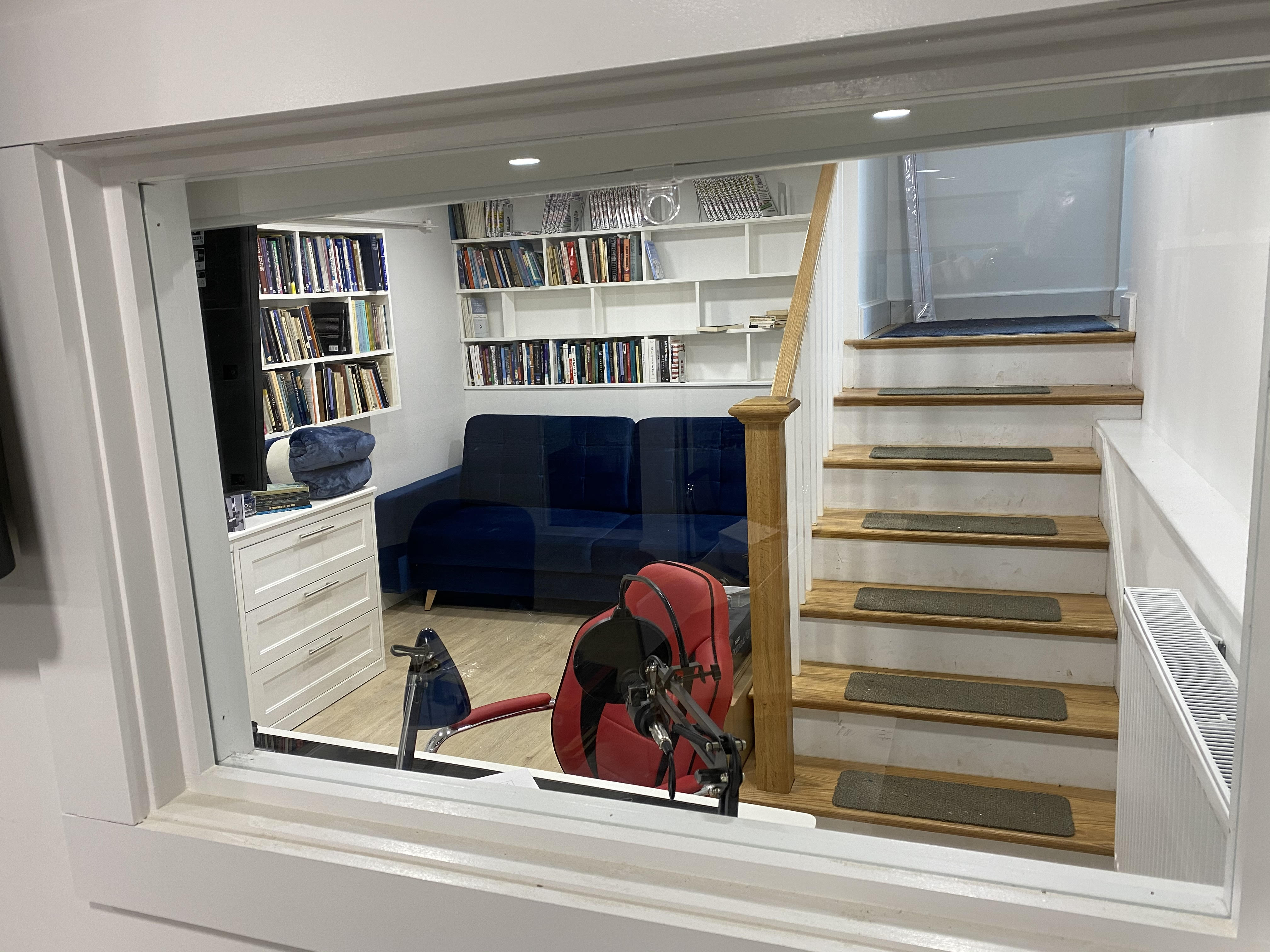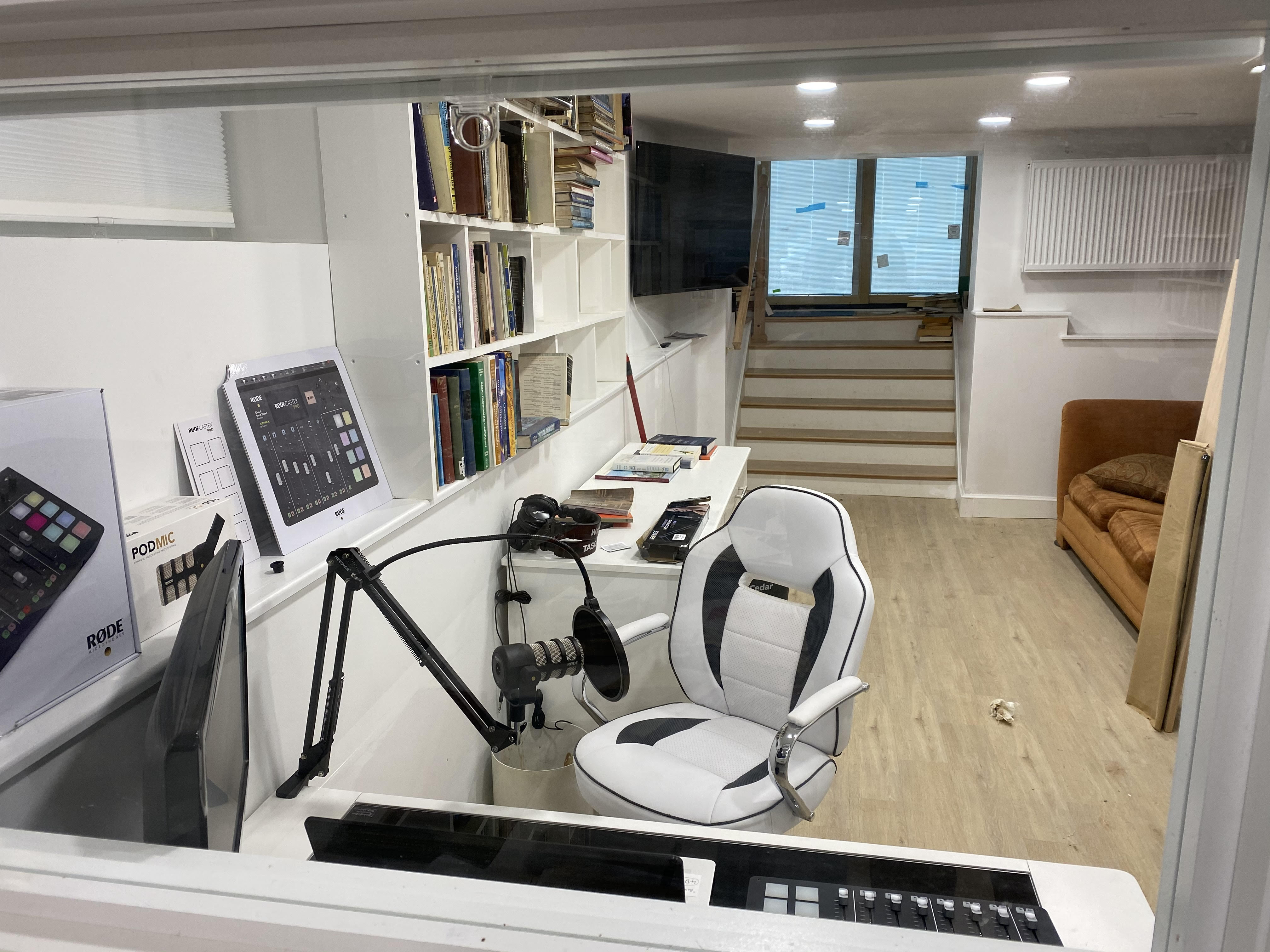Information Philosophy Institute
In the Fall of 2017 I completed the design and building of my own
iTV-Studio in the conference room, with the goal of delivering weekday
online lectures on philosophy, physics, and other topics for the rest of my life.
The studio streams live to CCTV in Cambridge and to both YouTube and Facebook. Between November and January I delivered
fifty online lectures. But the conference room became too hot for webcasting as the weather turned warm. I thought of a new heating/cooling system, maybe also insulating the walls (good for sound isolation).
I turned back to writing my
fourth book, on Albert Einstein, "My God, He Plays Dice!," with the goal of publication by my 82nd birthday in June, 2018. I completed several more chapters and developed many new insights into Einstein's thought, notably that the observable universe may contain only a finite amount of information. A finite volume contains only a finite number of particles of matter and energy. A finite volume also contains only a finite number (but
a number increasing rapidly with universe expansion) of energy-accessible phase-space cells ℏ
3.
Einstein suspected that the mathematical
continuum, with its infinite number of infinitesimal points, might not be the best description of a finite number of
discrete particles. His contemporary mathematicians,
Richard Dedekind,
Leopold Kronecker,
Herman Weyl,
L.E.J. Brouwer, and even
David Hilbert, thought that infinities and infinitesimals might simply be human
ideas. Material particles
really exist. A theoretical field may also be simply a human
idea. Perhaps, Einstein worried, his unified field theory may be just a "castle in the air?"
Einstein himself had shown that the continuous ether did not exist, but he feared that his general relativity was restoring a continuous gravitational field!
I put a lot of energy, time, and money into a pre-release screening of
Olivier Wright's PSI film at MIT on April 4,2018, hosting my colleagues in the free will debates,
Dan Dennett,
Bob Kane, and
Alfred Mele.
But then the newly elected president of the Harvard Crimson, Derek Xiao, accepted my standing offer to build an
iTV-Studio for the Crimson, modeled on my own conference room, with six cameras and two media computers. My grandson Carter and his associate Austin Dugas put the new
Crimson studio together in a matter of weeks in the basement of the Crimson building, next door to their 4-color press.
I next turned back to the Einstein book for several weeks. Beyond the goal of getting Einstein credit for so many of the basic concepts in quantum mechanics, I began to see how his view of an "objective" and "local" reality might explain some of the great quantum mysteries, like
entanglement and the
two-slit experiment.
But I then became totally distracted by the design and building of an
Information Philosophy Institute. I thought I might demolish a number of my
garages next door to put up a new building with four guest visitor offices, along with a new sound-isolated
iTV-Studio, a lecture space, and a screening room. I engaged a construction firm, who began with an architect and lawyer that cost several thousand dollars but who made little progress toward the goal of a new building.
Sadly, the idea of a new building was too ambitious and simply was not to be.
Instead I settled for remodeling the basement of 77 Huron Avenue with a smaller boiler room, an expanded workshop, offices for a sound-isolated
iTV-Studio with a screening room, offices for visiting colleagues, a remodeled bath, an expanded kitchenette, and new entrances at front and rear. This would also serve as a modest repository and archive of my
inventions as well as my
philosophical research.
The cellar had become cluttered with my work designing and building a dozen multi-camera
iTV-Studios, several in briefcases, the
iTV-Van, and the two room-size systems. The cellar foundation walls were leaking, flooding the floors with inches of standing water when it rained heavily. The old horsehair plaster and drop-down ceilings produced a lot of dust and dirt. Rugs on the rec room floor were stained and dirty. Floors above were sagging, perhaps because of termite damage years ago? The old steam heating system took up lots of space and overhead steam pipes were in the way everywhere.
My grandchildren were no longer using the pool table and pinball machines. My daughter-in-law had a sewing area and small exercise space, but the cellar was cold in the winter months. A new heating system could add radiators there.
I interviewed several contractors and finally found an
excellent one. He filed for building permits, one for remodeling the first floor bath next to our guest room, and another for the basement remodel. He got the first, but not the second, which was delayed for months. See
my design and building plans and progress here.
With basement remodeling on hold, I went back to the Einstein book, and by year end had my
fifth draft. Writing had begun in August 2015 and I finally uploaded the print book to
Amazon in February, 2019.
Serious work on the basement renovation began then, after a meeting with Cambridge Zoning commissioner Rangit SInganayagam, who approved the building permit when he saw the plans for improving my workspaces were not an attempt to add a new apartment.

I had been hoping the new offices would be finished by my 83rd birthday in mid-June. But final inspection was only completed in late August.
I am now designing
solar energy for my flat roof, so I can charge my first electric car (Tesla Model 3) directly from the sun and "off the grid."
I plan to cover the old black EPDM roof (which has not leaked for years since Holly and I patched it) with a white PVC membrane and the latest solar panels with microinverters. I began to
research solar panels and
PVC roofs intensely.
The new roof and solar panels are now postponed until 2020. They need to be done in the same year.
Here is the current floor plan of the IΦI (I-Phi) institute studio offices.

And here are some panoramic photos of the different rooms.

The new screening room and archive of inventions

The front office/studio with new driveway entrance/stairway

From the front to the back of the control room.

From back office/guest room door, bath, kitchenette, a peek into the archive/museum, and door to front guest room/office.

The new workshop

Front Studio

Front Studio through window

Back Studio

Back Studio through window

Conference Room and
iTV-Studio
Right-click to open in a new tab
Normal |
Teacher |
Scholar